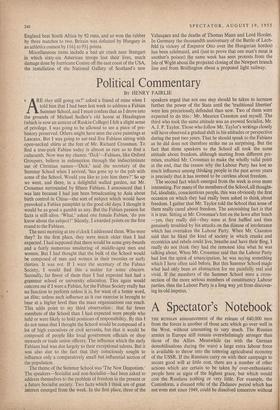Political Commentary
BY HENRY FAIRLIE 6E they still going on?' asked a friend of mine when I
R I
told him that I had been last week to address a Fabian Summer School, and I must confess that as I drove into the grounds of Michael Sadleir's old house at Headington (which is now an annexe of Ruskin College) I felt a slight sense of privilege. I was going to be allowed to see a piece of pre- history preserved. Others might have seen the cave paintings at Lascaux. But I was going to see real live Fabians sitting with open4necked shirts at the feet of Mr. Richard Crossman. To find a true-pink Fabian today is almost as rare as to find a coelacanth. Now was my chance. Tick'—Fabians, like Oxford Groupers, believe in redemption through the indiscriminate use of Christian names—Tick,' said the secretary of the Summer School when I arrived, 'has gone up to the pub with some a the School. Would you like to join him there?' So up we went, and there, in a delightful walled garden, sat Mr. Crossman surrounded by fifteen Fabians. I announced that I was late because I had just been broadcasting to Asia about birth control in China—the sort of subject which would have provoked a Fabian pamphlet in the good old days. I thought it would be as good a gambit as any. But the Fabian passion for facts is still alive. 'What,' asked one female Fabian, 'do you know about the subject?' Silently, I awarded points on the first round to the Fabians.
The next morning at ten o'clock I addressed them. Who were they? In the first place, they were much older than I had expected. I had supposed that there would be some grey-beards and a fairly numerous smattering of middle-aged men and women. But I had thought that the bulk of the School would be composed of men and women in their twenties or early thirties. It was not. If I were the secretary of the Fabian Society, I would find this a matter for some concern. Secondly, far fewer of them than I had expected had had a grammar school or university education. This again would concern me if I were a Fabian, for the Fabian Society really has no function to perform unless it is, for want of a better word, an elite; unless such influence as it can exercise is brought to bear at a higher level than the mass organisations can reach. This adds point to my third observation : that far fewer members of the School than I had expected were people who held or were likely to hold positions of responsibility. By this I do not mean that I thought the School would be composed of a lot of high executives or civil servants, but that it would be composed of people like local government officials or shop stewards or trade union officers. The influence which the early Fabians had was due largely to their exceptional talents. But it was also due to the fact that they consciously sought to influence only a comparatively small but influential section of the population.
The theme of the Summer School was 'The New Despotism.' The speakers—Socialist and non-Socialist—had been asked to address themselves to the problem of freedom in the present or a future Socialist society. Two facts which I think are of great interest emerged from the week. In the first place, three of the speakers urged that not one step should be taken to increase further the power of the State until the 'traditional liberties' were less precariously, defended than now. Two of them were expected to do this : Mr. Maurice Cranston and myself. The third who took the same attitude was an avowed Socialist, Mr. A. J. P. Taylor. Those who follow Mr. Taylor's writings closely will have observed a gradual shift in his attitudes or perspective during the past two years. That he should speak to the Fabians as he did does not therefore strike me as surprising. But the fact that three speakers to the School all took the same attitude about freedom, although starting from different pre- mises, enabled Mr. Crossman to make the wholly valid point at the end, that the reason why the Labour Party has lost so much influence among thinkiing people in the past seven years is precisely that it has seemed to be careless about freedom.
The second fact which emerged from the week is even more interesting. For many of the members of the School, all thought- ful, idealistic, conscientious people, this was obviously the first occasion on which they had really been asked to think about freedom. I gather that Mr. Taylor told the School that none of them really cared about freedom. The astonishing fact is that it is true. Sitting at Mr. Crossman's feet on the lawn after lunch —yes, they really didthey were at first baffled and then genuinely troubled by his attacks on the disease of intolerance which has overtaken the Labour Party. When Mr. Cranston said that he liked the kind of society in which cranks and eccentrics and rebels could live, breathe and have their fling, I really do not think they had the remotest idea what he was talking about. When Mr. Crossman said that the Labour Party had lost the spirit of emancipation, he was saying something which I have often said before. But this Summer School made what had only been an abstraction for me painfully real and vivid. If the members of the Summer School were a cross- section of the more serious members of constituency Labour parties, then the Labour Party is a long way yet from discover- ing its old impetus.


































 Previous page
Previous page